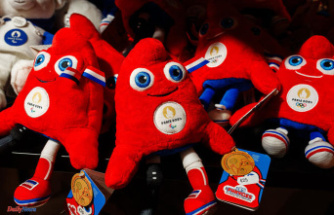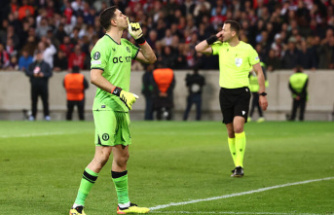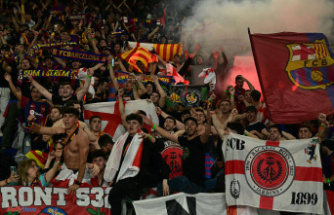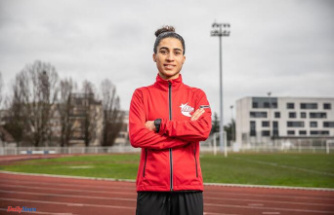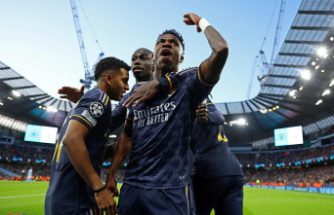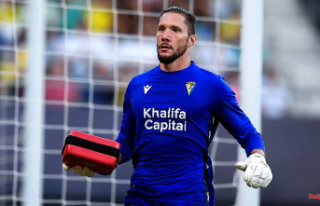In the end, the German basketball players fight their way dramatically into the quarter-finals of the European Championship because Dennis Schröder grows from being a scapegoat to becoming a leader. After a disaster in 2019, he and his team are experiencing a rebirth - and big dreams could suddenly come true.
Comparisons are often made in sports. Partly fitting, partly pipe dreaming. Don't worry, nobody draws parallels to Jesus Christ when talking about Dennis Schröder these days. But still: The captain of the German national basketball team experienced a kind of resurrection at the European Championship. A rebirth for someone who had so often failed in the past because of his own claim to leadership. For someone who used his words to build castles in the air that crumbled into ruins. Schröder is now the undisputed boss and is leading Germany to the quarter-finals with leadership and performance.
The DBB team falters. At the break they are 24 points ahead and everything seems to be set for the round of 16 victory in Berlin over Montenegro, but then the team of national coach Gordon Herbert threatens to gamble away everything in the end. But not with Boss Dennis Schröder. Both offensively and defensively, the 28-year-old takes over the game again and again in important situations, is the organizer of a German team that always appears with commitment - apart from the Montenegrins catching up. There are three scenes in the narrow 85:79 win that symbolize Schröder's entire reincarnation in this tournament.
Schroeder, the fighter. 30 seconds before the end, the playmaker loses the ball badly, Montenegro converts the counter-attack to 77:80. Drama ensues after Germany lead the entire game. But Schröder doesn't complain, doesn't get frustrated, doesn't hang his head like he might have done a few years ago. Instead, he fights for the perfect response on court, converting a crucial three of three clutch free throws with 23 seconds on the clock. The win is perfect. "Dennis is good for us, he carries us all the time," said center Jonas Wohlfarth-Bottermann after the game. "He's always the one who wants it the most," adds Johannes Thiemann, "on and off the court." Schröder himself judges pragmatically: "Whoever stays cool and gives the right answers wins the game."
Scene two: Schröder, who improves his teammates. Right at the beginning of the game he plays a fantastically beautiful no-look pass to NBA professional Daniel Theis. A spectacular alley-oop allure follows shortly thereafter. The point guard puts his teammates in the limelight early on so that they gain self-confidence and are good in the game. Again and again he calls out orders and instructions, motivates his neighbors. Shortly before the end, boss Schröder trusts his team-mates when he circles his opponent, pulls into the zone under the basket at breakneck speed and cleverly passes the ball past a defender who is rushing out. By the end of the game, he had eight assists. The entire rest of the team comes to eleven.
It is important that the national team is no longer completely dependent on Schröder's points. He no longer has to do everything offensively, as was often the case in previous tournaments. It is only thanks to this trust in his teammates that he becomes the leader that he was unable to be at the 2019 World Cup (more on that later). "We now have a lot of players who can support the team and are very balanced," said Thiemann. And Theis explains: "It's important that everyone plays with confidence. That's what sets us apart as a team."
Of course, Schröder can still deliver not only templates, but also points. And how. 22, most of the German team, are there in the end. The most beautiful two are an exclamation point two minutes before the end of the first half and represent scene three: With two or three quick steps, the playmaker pulls past his opponent on the right, takes off - and bang: stuffs the ball with a spectacular dunk in the Basket! The hall in Berlin explodes. When asked about the action, he only grins mischievously after the win: "Yes, it was good."
Schröder, the executor, the busy, fast, ice-cold scorer. Who feels in every situation with his move to the basket and with medium-distance throws (his threesome does not fall in this game as so often, Schröder's greatest weakness) can deliver points to give the German team a little boost when it is particularly important . With these actions, too, he shoulders the team and leads it. But that was not always so. And not everyone believed in Dennis Schröder's leadership qualities.
Looking back at World Cup 2019 in China. Back to why Schröder needed a rebirth in the first place. "I think he's not a leader. He's the best player, but not a leader," said Marko Pesic, sports director of German basketball champions Bayern Munich. Before that, the tournament had ended in disaster for Germany. After the embarrassing defeat in the second game against the Dominican Republic, Schröder, who was considered to be highly gifted, and his teammates were already eliminated.
At the time, many hopes rested on the fast playmaker, who proclaimed himself the "leader" of the team. But because the point guard could not meet the high expectations (Germany was even traded as a medal candidate) and instead mobbed and sulked on the field, he received harsh criticism and became the scapegoat. Now the resurrection to the leader follows at the EM. Schröder finally shows what he's really made of. That he can fight and move forward.
That he also has this mentality is not clear to the point guard who grew up in Braunschweig. His career sounds a bit like a Hollywood story. At the age of eleven, he was discovered on the field by his later assistant coach of the Phantoms, the Bundesliga club in his hometown at the time. Schröder skates there with friends - and then gets them wet playing basketball on the concrete court. A meteoric rise to the Bundesliga follows, and the playmaker can always rely on his pure basketball talent. He might rest on that for a bit.
In 2013, Schröder was invited to the Nike Hoop Summit in the USA and, like Dirk Nowitzki in 1998, measured himself against the best high school talent. An honour. But back then, he was blamed for a lack of respect here and there. But Schröder, who at the time was still helping out in his mother's hair salon, fought his way through and made it into the NBA and the national team. In this he now takes on the responsibility that he also has to take on in his family when his father dies in the teenage years of basketball talent and the adolescent takes care of his younger siblings.
Both Schröder and the DBB team have experienced a resurrection, have emancipated themselves. Against Montenegro - even if it gets unnecessarily exciting in the end - a tactically variable and self-confident structure with a healthy hierarchy can be seen for long stretches. And so the dream of the third European Championship medal after gold in 1993 and silver in 2005 lives on. "We want to achieve something with the national team at some point. Our goal now is to win a medal. We're not getting any younger," said Theis before the round of 16.
In order for the dream to become a reality, however, Germany will probably have to get rid of the giants Giannis Antetokounmpo and Greece (favorites in the round of 16 against the Czech Republic in the evening at 8.45 p.m.) in the quarter-finals on Tuesday. "You can't defend Giannis one-on-one. You need the whole team, the whole defense," says Theis. It's a good thing that Germany will have the resurrected boss Dennis Schröder again. The scorer, the fighter. The whole team Bessermacher.
(This article was first published on Sunday, September 11, 2022.)


